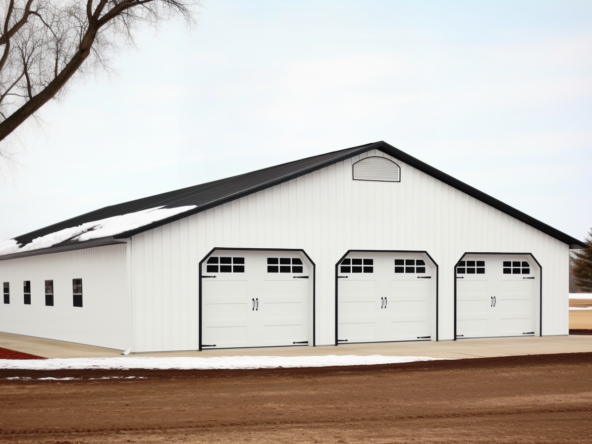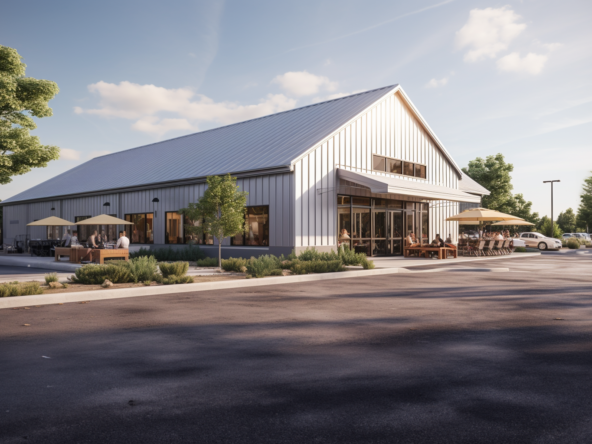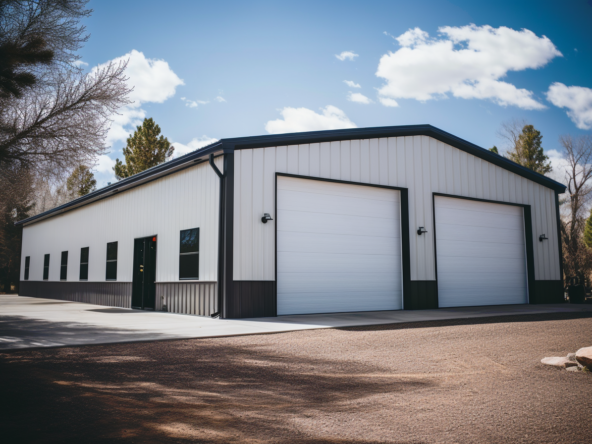Choosing the Best Floor for Your Steel Frame Shop or Garage
Constructing a new steel frame shop or Garage whether that be commercial or just something for the farm, a detached shop or garage provides a wonderful spacious utility that just about anyone could find a use for. Depending on what that use is may determine what type of Flooring you might choose for your Steel frame building. Yet many owners overlook thoughtfully planning appropriate flooring for their planned use, and abuse, and commonly overlook issues like difficulty of cleaning. Typical concrete slab floors can stain, degrade, and contribute to fatigue over the years. Fortunately, several rugged flooring options suit steel building interiors much better and are readily available some flooring can even be bought at some of the big name box stores everyone is familiar with allowing for plenty of flooring options close to home instead of ordering flooring online and contending with the steep shipping cost, because flooring isn’t lightweight material in most cases.
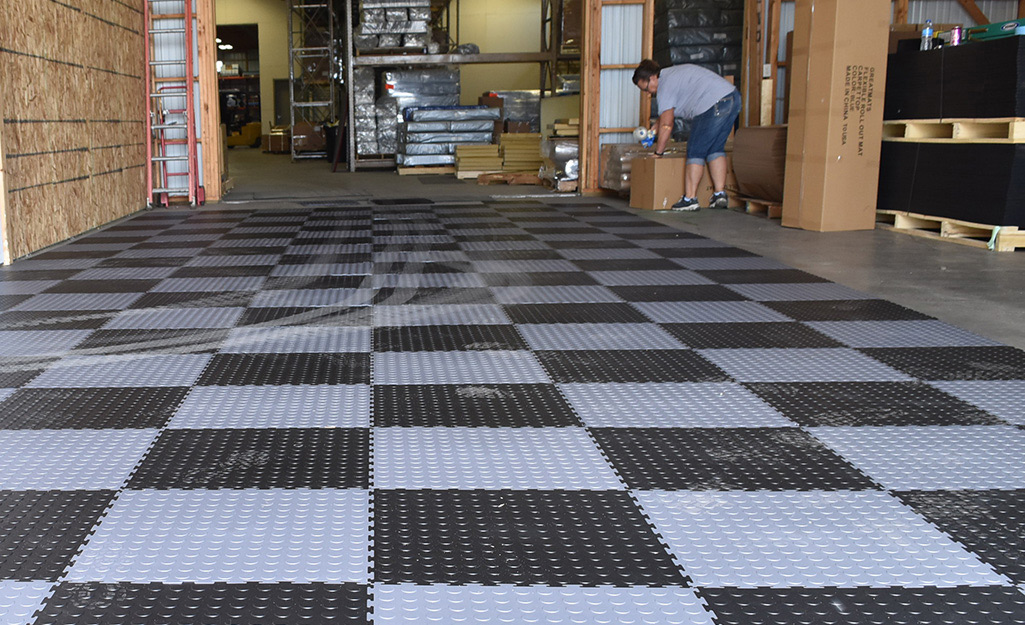
Epoxy Floor Coatings
For heavy workshop use, a thick epoxy resin floor coating creates a glossy, protective barrier fortifying concrete from years of wear. Quality industrial epoxies bond tightly to properly prepped slabs while tolerating vehicle fluids, solvent spills and high impacts. Some epoxy systems incorporate grip additives for slip resistance like colorful flakes or quartz sand. Polyaspartic and polyurea floor coatings offer similar protection with even greater durability, flexibility, and faster cure times. Just keep in mind professional installation is recommended for proper preparation and adhesion.
Here are some key things to know about epoxy floor coatings:
– Application Surface – The concrete floor surface needs to be thoroughly cleaned, etched, and primed properly for the epoxy to adhere correctly. Removing all oils, sealants, or deteriorating substrates is vital.
– Moisture Testing – Concrete must be tested for moisture to avoid future failure of the coating from vapor drive or hydrostatic pressure. Test methods include calcium chloride, relative humidity probes, and plastic sheet tests.
– Coating Selection – Consider the performance traits needed – chemical resistance, hot tire resistance, anti-slip texture, etc. as well as desired gloss levels. Two-part, 100% solids epoxies are best for garage use.
– Coverage Rate – Determine how many square feet the volume of coating product will cover according to manufacturer specifications for the proper coating thickness, usually 10-30 mils.
– Application Method – Options include self-leveling application with squeegees, loops and rollers as well as broadcasting colored chips/sand for a decorative flake floor. Allow 2-3 days for full cure.
– Joint Treatment – All existing control joints or saw cuts must be honored and treated to avoid cracking of the epoxy near them. Typically backer rod and joint sealant is installed.
– Edge Details – Coatings should continue partially up the side walls about 6 inches to protect from paint chips and other wall debris. Terminate neatly at saw-cut joints.
Choosing professional installation will help get the floor preparation, moisture testing, joints, application process, and protective top coatings correct for the best longevity of an epoxy or polyaspartic garage floor coating system.
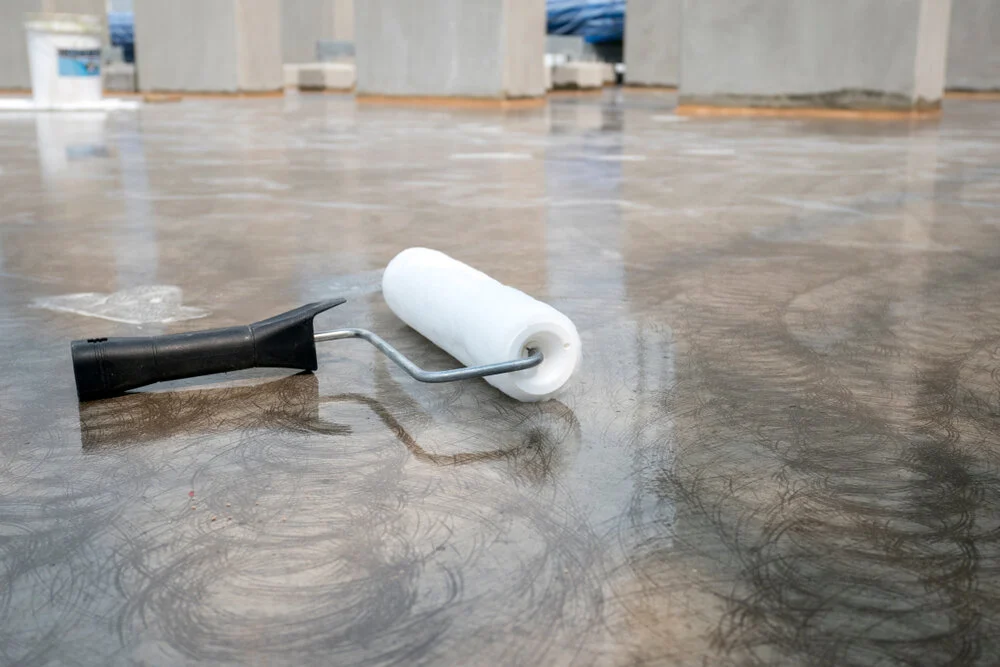
Interlocking Tiles
For DIY-friendly modular protection, interlocking floor tiles float atop the concrete slab to buffer heavy objects. These snap-together 12 to 24-inch polypropylene panels allow custom layouts combining colors and textures by zone. From dynamic racing checker patterns under lift areas to solid colors delineating work benches, customization promotes safety through organization. Tile portability also permits easy access beneath for plumbing and electrical upgrades. Just ensure load-bearing capacity meets expected vehicle or storage equipment weights with a proper subfloor.
Here are some key considerations when using interlocking tiles for Garage flooring:
Material Options:
– Polypropylene – Most common. Budget-friendly, chemical & stain resistant. Can become slippery with car fluids.
– PVC – Handles temperature fluctuations well. Easy to clean but seams wear faster under vehicle traffic.
– Rubber – More cushion and comfort underfoot but stains easier from chemical spills.
Performance Factors:
– Modular Design – Tiles connect in various patterns for custom layouts. Re-configure or replace only worn/damaged sections.
– Fast Installation – Float tiles on top of existing slab for quick DIY projects. No adhesive curing delays.
– Cost-Effective – At approximately $3-7 per square foot, a value flooring layer for unfinished garages.
– Comfortable – Softer surface and insulating air gap reduce fatigue from long periods of standing.
– Sound Dampening – Reduces vehicle noise and tool impacts compared to bare concrete.
Considerations:
– Not fully bonded like epoxy so tiles can shift from wheel torque or heavy loads if insufficient subfloor.
– Chemical resistance inferior to resinous floor coatings depending on tile material.
– Surface patterns and grout lines increase cleaning maintenance compared to an easy-wipe resin.
Overall interlocking tiles serve as an affordable, user-friendly garage floor covering able to enhance comfort, safety, and aesthetics compared to raw concrete. Just ensure tile capacity suits expected vehicle weights.

Resinous Flooring
Resinous floor systems like TuffRez provide all the protection against epoxies with easier DIY application. Combining primer, double broadcast layers of colored quartz, multiple protective coats, and a top sealant creates a 1/4-inch thick floor able to withstand over 12,000 psi of pressure. This rivals concrete itself for strength while adding grip texture. Chemical resistance prevents petroleum or solvent damage while tolerating steam cleaning or hot tire pickup. Installation flexibility from a single-car bay to 10,000 square feet makes resinous floors ideal for ongoing garage and shop expansions.
Here are key things to understand when considering industrial-grade epoxy flooring for a shop or garage:
Durability – Industrial epoxies create a thick, protective barrier highly resistant to cracks, impacts, chemicals, and wear. Layers of colored quartz sand provide texture for grip. Overall more durable than tile or paints.
Preparation – Proper prep work is vital for epoxy adhesion and longevity. The surface needs thorough cleaning, etching, moisture testing, and priming before application.
Performance – 100% solids epoxies cure harder and resist Hot Tire Pickup versus cheaper water-based. Some systems have the flexibility to resist cracking or offer antimicrobial properties.
Application – Self-leveling installation requires proper technique during squeegee, backroll, and broadcast steps. Retaining professional contractors is recommended.
Cost – Industrial epoxy floor cost is $6-9 per square foot professionally installed. Labor matching prep work to complex layouts increases the price for quality coatings designed to last 10-20 years.
Cure Time – Recoat windows and return-to-service vary by product, from 24 hours to 7 days. Plan workspace disruption accordingly during the application schedule.
While expensive as a flooring investment initially, properly installed industrial-grade epoxy floors provide long-term payback over years of heavy usage in shops and garages via simple maintenance, heated radiant potential, and bright aesthetics improving the safety and disposition of users.

Steel frame structures assembled rapidly can then enjoy years of rugged use by planning appropriate flooring during construction. Whether applying thick professional epoxy barriers or do-it-yourself grid tiles, protecting the interior concrete slab from first occupation extends the pristine utility of your steel-framed shop or garage for the years ahead. Be sure to research or consult experts on flooring capacities, life cycles, and installation considerations before anchoring racking, machinery, or vehicles atop a bare concrete floor. The ideal flooring system defends itself so you can think productively about the business or projects at hand rather than floor maintenance.


